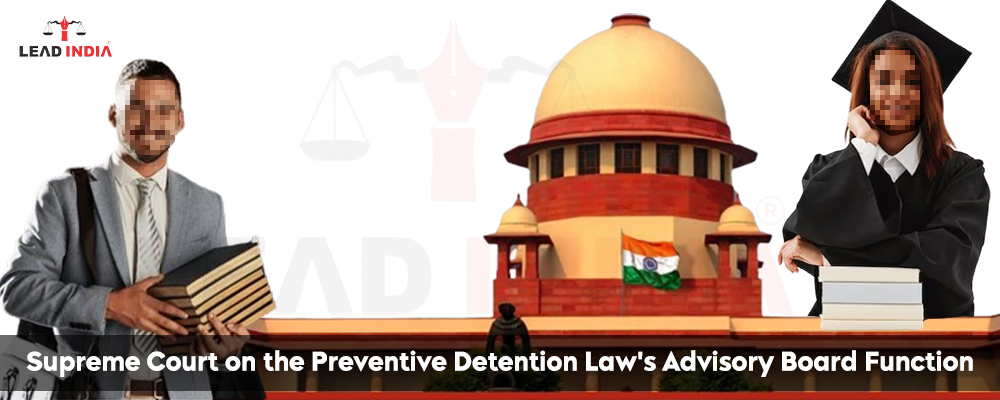The Supreme Court ruled that advisory boards under severe preventive detention legislation should not function as mere “rubber-stamping authorities” for the government, but rather as safety valves that stand between the state’s capricious use of power and the right to personal liberty.
Legal Provisions
Preventive detention is the incarceration of a person without trial or conviction by a court. Its objective is not to penalize a person for a past offense but to keep him from committing another shortly. A person’s imprisonment cannot last more than three months unless an advisory body provides adequate cause for an extension.
Article 22 of the Constitution requires preventive detention statutes to establish advisory bodies made up of individuals eligible to serve as High Court judges. Different laws require review boards to evaluate detention orders every three months to determine whether there is a sufficient reason for preventative custody. They analyze the evidence, request additional information if necessary, listen to the individual held, and then report on whether the custody was warranted or not.
Objective: It must decide if the detention is essential not only in the eyes of the detaining authority but also in the eyes of the law.
The judgment was issued in response to an appeal filed by a man who had been ordered by Telangana police to be held as a ‘goonda’ under the Telangana Prevention of Dangerous Activities Act, 1986.
Telangana police said that the man posed a threat to “public order”. He instilled fright and anxiety in women. The appellant was accused of often stealing his victims”mangalsutras’ in broad daylight.
Need A Legal Advice
The internet is not a lawyer and neither are you. Talk to a real lawyer about your legal issue

The Supreme Court ruled on the appeal filed under the Telangana Prevention of Dangerous Activities Act, 1986
- Qualifications of the Advisory Board Members: Justice Pardiwala emphasized the importance of having qualified members on advisory boards who are potentially eligible to serve as High Court justices. This ensures that the government’s detention orders are thoroughly reviewed.
- Advisory Board Responsibilities: Various laws compel these committees to review detention orders every three months.
- Substantial Evidence to Support Detention: Justice Pardiwala emphasized the unfairness of depriving someone of their liberty only on the belief that they will commit a crime in the future. He emphasized the significance of strong evidence to justify imprisonment.
- Absence of Evidence of Threat to Public Order: The Supreme Court found that the state did not submit adequate evidence to show that the detained individual posed a serious threat to public order. There was no strong evidence linking him to actions that could disrupt public order.
The distinction between ‘public order ‘and’ law and order and preventive detention
- Differentiating ‘Public Order’ and ‘Law and Order’: Justice Pardiwala distinguished between ‘law and order’ issues, which affect only a few people, and ‘public order’ concerns, which affect the entire community or even the country.
- Limitations of Preventive Detention: The Supreme Court emphasized that preventive detention should be used only in extraordinary circumstances.
- Quashing of Detention Order: Justice Pardiwala quashed the appellant’s detention order since he had no direct involvement in any of the First Information Reports (FIRs).
The judgment clarified that for a person’s activities to be considered “acting in any manner prejudicial to the maintenance of public order,” they must be of such a character that Ordinary laws cannot deal with them or prevent subversive actions from harming society. “Inability on the part of the State’s police machinery to tackle the law and order situation should not be an excuse to invoke the jurisdiction of preventive detention,” the judge said.
Justice Pardiwala quashed the detention order, claiming that none of the FIRs against the appellant named him. According to the court, it appeared that he had been arrested on suspicion.
The Supreme Court emphasizes that advisory boards in preventive detention regulations are not only rubber stamps for the government but also defend personal liberty. They must establish the necessity of detention using strong evidence and limit preventative detention to exceptional circumstances.
Lead India offers free legal advice and online information, in addition to other legal services. We provide a forum to speak with a lawyer and ask legal questions. Lead India’s solicitors can help you with any legal difficulties. Lead India’s solicitors may assist you with any legal issues. Lead India also provides free online legal help in India. In addition to giving online legal assistance, Lead India allows users to ask specialist questions for free.




